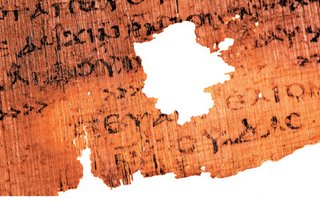On the Gospel of Judas
 I had a friend send me this Denver Post article on the discovery of an ancient document which has been called the Gospel of Judas. Here are the reflections I sent him:
I had a friend send me this Denver Post article on the discovery of an ancient document which has been called the Gospel of Judas. Here are the reflections I sent him:Many articles have appeared recently talking through this discovery. The author of the Denver Post piece, along with many other I read recently, does his best to build up the scandalous nature of the document. He seems to insist that there is no difference in the historic reliability between this book and the four Gospels. However, as the article progresses he begins to let out some of the more important details. For example, that it is a Gnostic document and that it is a product of the second century.
The Gnostic Gospels (Thomas, Mary Magdalene, Peter, etc) discovered over the last century are all quite fictious. In one scene of the Gospel of Thomas (the one Gnostic scholars regard as the most reliable), Jesus turns one of his childhood friends into a toad. He also insists that to be a disciple women must become men. It is rather goofy stuff.
These Gnostic writings are products of the 2nd century, as the writer notes, "The 26-page Judas text is said to be a copy in Coptic, made around A.D. 300, of the original Gospel of Judas, written in Greek the century before."

Unlike the four gospels which were written by friends, followers, and first century historians, these Gnostic Gospels don't have much credibility historically.
We might imagine waking up tomorrow and reading in the newspaper: "New Discovery: Historic Documents reveal the intimate conversations of Abraham Lincoln, saying he really hated slaves and secretly hoped the South would win." But as we read on, we come to find out the historic document was written in 1987.
That is the same time frame between Jesus life and the writing of this work.
The first paragraph in the Judas Gospel says, "The secret account of the revelation that Jesus spoke in conversation with Judas Iscariot during a week three days before he celebrated Passover."
It is tough to record accurate history about what was said in a secret conversation between two friends one hundred and fifty years after the fact, but it is nearly impossible when both Jesus and Judas died within the next four days. If Judas survived, maybe it could be argued that this was a memoir, or that he passed his story on to the early gnostic Christians--but the record is real clear that Judas lost all his friends, and committed suicide the same week Jesus was crucified. It doesn't seem he was very interested in leaving a legacy.
In my quick over view of the first 7 pages, the Judas Gospel tries to be like the other gospels: having Jesus say cryptic things that his disciples do not understand. But it also suggests that Jesus changed his bodily form to become a young boy, and it seems to suggest that Jesus traveled through time to other places where the people were more "holy."
Again, these Gnostic Documents are just weird.
You can read the first 7 pages here. The National Geographic Society has created a detailed site here on the document, which they may own.
Gnosticism (as we will see again with all the Da Vinci Code stuff coming soon) has no historic footing. It died early in Christian history, and today it thrives on conspiracy, pushing a "discover yourself" theology, and a little PT Barnum thrown in to capture the attention of Newsweek and Time.

4 Comments:
J - Would you mind going over the historic credibility of the actual gospels too? I hear so much about them not being credible too, that I would like to hear your take on them as well. Bet
I think I will do some of this at some point at Atlas. Probably in the next year. Give me a little while and I will write out some quick thoughts
Here is a start (by an actual scholar):
http://www.markdroberts.com/htmfiles/resources/gospelsreliable.htm
Let me know what you think, and if you have any specific questions (or places where you think the articles just aren't doing the work), let me know, and I'll put those in my post.
Jeff, I was wondering what your thoughts were on the gnostic elements found in John ie the contrast beween light and dark, the holy spiritual and the broken physical, and well I can't think of the others right now but.. you know what I am saying? It seems odd considering the earliest john is found around what? 123 CE? and the other gnostics much later. Do you think John was only an influence for the gnostic christians or that the johannine community may have been the first, and perhaps only credible, community of gnostics, or what? Just curious. ttyl
Matt - It seems to me that John is the most anti-Gnostic writer in the NT. He is consistently attacking Gnosticism by asserting over and again that Jesus came "in the Flesh." Notice 1 John 4:2, "Every spirit that acknowledges that Jesus Christ has come in the flesh is from God. This is the Spirit of the antichrist, which you have heard is coming and even now is already in the world."
That is the single most anti-gnostic verse in the Scripture (at least first century gnosticism), and it comes from John.
The contrast between light and dark need not be gnostic in nature. We would affirm a monism where everything is One if we didn't affirm a contrast between light and dark; good and bad.
However, on the broken physical over against the Spiritual, we need to see that the Spirit of God is not against broken humanity, not a firm contrast. He is FOR them. He is making them New again. This is most elegantly and brilliantly displayed in the last two chapters of Revelation (also written by John).
Distinction and contrast need not make us Gnostics. It is which dichotomies we will embrace as central to our metanarrative that define our position. Light v. Dark; death v. life; hope v. despair; God v. illusion are all grounded in the Christian tradition, even if Gnosticism holds a few themselves.
So these are some of the places I would like to go.
What do you think?
Jeff
Post a Comment
<< Home